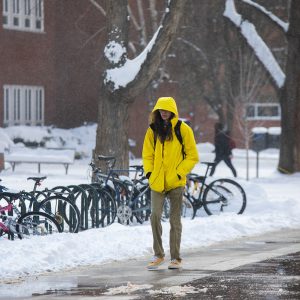As I sit on my couch- swaddled in blankets, watching a chick-flick, and eating mac and cheese – I imagine myself as a bear in hibernation.
Many of our mammal friends have evolved to slow down in winter, investing in rest to be ready for the coming spring. Humans, on the other hand, are often busier than ever. We’re wrapping up the semester, preparing for the holiday season, and juggling all our other commitments.
 It can be… draining. As the temperatures dip and the days get cut short, many find that they’re feeling a little blue during this time of year.
It can be… draining. As the temperatures dip and the days get cut short, many find that they’re feeling a little blue during this time of year.
The wintertime blues is a common phenomenon that can strike anyone. It can look different based on the person.
Some may feel a decrease in energy or more tired than usual, others may feel morose or emotional. However it hits you, know that you’re not alone.
What causes wintertime blues?
The main biological cause for this dip in energy is less light. This change in light does all kinds of funky stuff to our hormones. There are also other external factors like being busy (hello, finals week), the holidays, or the weather.
Less light = hormone shifts
Sunlight decreases our production of melatonin, which is involved in making us sleepy. With less sun exposure, our bodies make more melatonin. This results in us feeling very sleepy and fatigued.
This isn’t the only hormone that is impacted, though. Serotonin, also known as one of our “happy hormones”, also decreases this time of year due to less sunlight. Serotonin acts as a mood stabilizer and affects our appetite.
So, if you are feeling super tired, hungry, and your mood is all over the place… blame your hormones!
Decreased ability to get outside
Cold temperatures, snow, and less daylight hours can get in the way of getting outside in the winter, especially if you use nature as a form of therapy. Then, you really feel the effects of not being able to get outside. This can impact our sunlight exposure, physical activity, and stress management.
Holiday stress
Even if you have the most drama-free and amazing family in the world, the holidays can still be a source of stress. From buying or making gifts, to travel and planning, to socializing for days or weeks on end… It is a total shift in our regular lives. It can be especially stressful if there is family drama, or if you find yourself alone during the holidays.
Tips to help
Tip #1: Pay attention and plan accordingly
Be mindful of how you are feeling and what kind of patterns you notice in your mind and body. Do you notice that you feel a slump of energy around the same time every year?
If possible, plan your schedule to honor this energy shift so you don’t have as much on your plate. This is not always possible, especially as a busy student, but feel free to cut any “extras” that just aren’t doing it for you right now.
Tip #2: Get moving
Being active reduces stress hormones AND raises endorphins (like serotonin). If you have lofty ideas of what physical activity needs to be, try challenging these ideas. Movement can also mean a 10-minute solo dance party, taking a walk, or cleaning your house.
Tip #3: Social support
Having a friend to talk to about how you’re feeling can help lighten your load. It helps to know that you’re not alone and have someone validate your feelings.
Tip #4: Bonus tips
- Invest in a SAD therapy light
- Make time for things that bring you joy (baking, drawing, whatever you like!)
- Practice affirmations and self-compassion
This time of year can be tough for many people. It can also be an opportunity for us to give ourselves some much needed rest and self-care. Embrace your inner bear this winter season!
Note: If your wintertime blues become more severe and impact your daily life, you may have Seasonal Affective Disorder (SAD). This is a more severe condition that is considered a major depressive disorder.
SAD impacts somewhere between 0.5 to 2% of Americans, and even more if you already suffer from depression. If you think you are suffering from SAD, please reach out to your doctor or therapist for support. You don’t need to struggle alone.